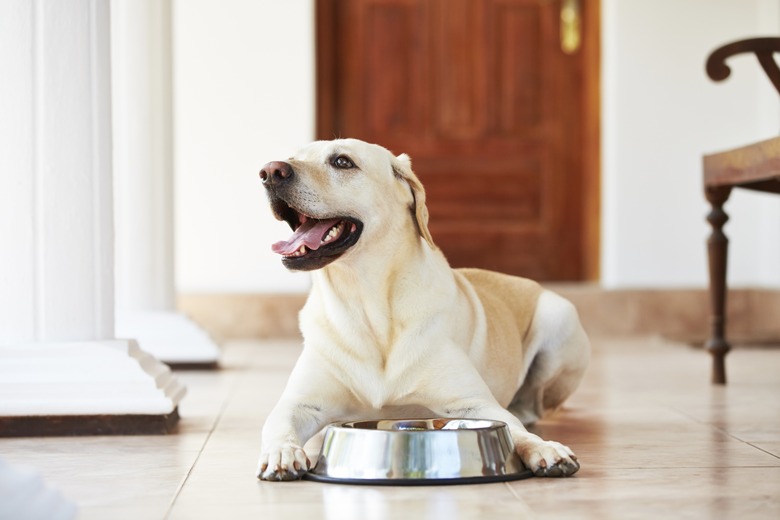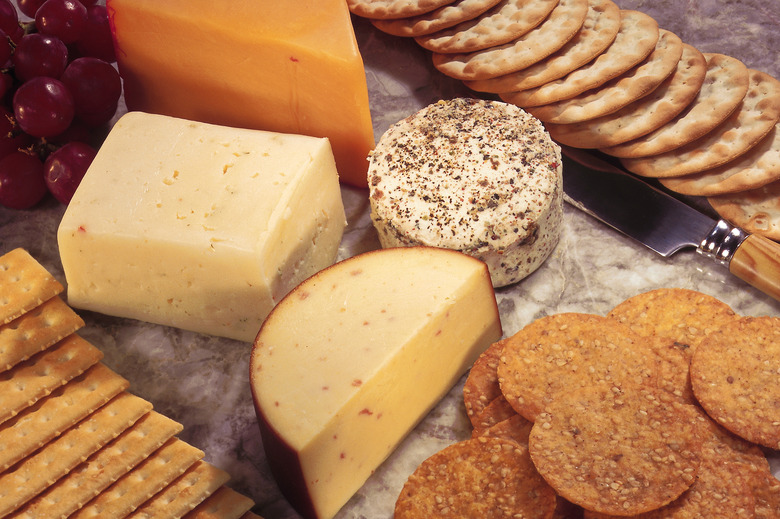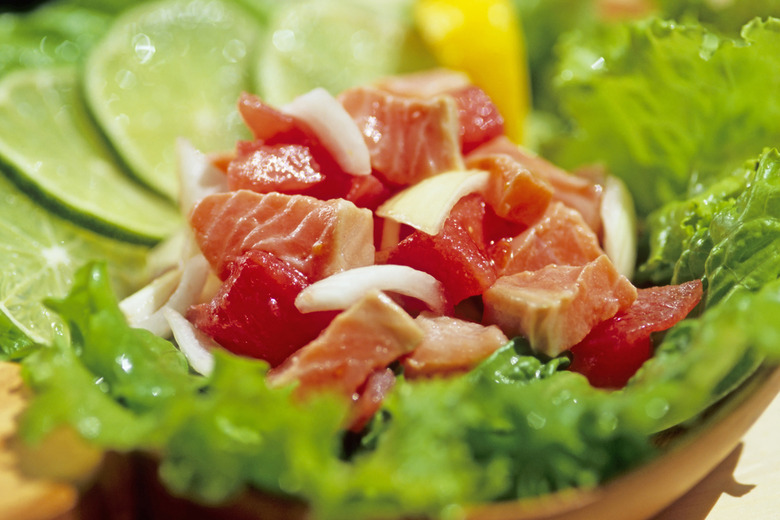A List Of Foods Dogs Can't Eat
As tempting as it may be to let your dog polish off the table scraps he's begging for, you should first make sure your meal did not contain ingredients that could harm him. Several foods you might have in your refrigerator or pantry can make dogs sick, in some cases with fatal consequences. Get your dog veterinary attention right away if you believe he has eaten anything potentially toxic.
Chocolate and Candy
Chocolate and Candy
Chocolate contains two chemicals that are toxic to dogs: caffeine and theobromine. The darker the chocolate, the more of these chemicals it contains and, the more toxic it is. According to the Merck Veterinary Manual, an ounce of milk chocolate per pound of body weight is a large enough dose to kill a dog. Also well out of your dog's reach should be your stash of sugar-free chewing gum, which contains an artificial sweetener called xylitol that can cause dangerous drops in blood sugar levels in canines. Symptoms of xylitol intoxication, which include weakness, disorientation and seizures, may be seen within 30 minutes, but can take as many 18 hours to manifest. A dog who has eaten large quantities of xylitol may develop life-threatening liver failure.
Fruits and Vegetables
Fruits and Vegetables
Whether raw or cooked, hops, a fruit used to make beer, can cause a fever in dogs high enough to damage vital organs, leading to death. Moreover, your dog could need a blood transfusion if he eats significant amounts of onion, garlic, shallots or scallion, which cause red blood cell damage in canines. These vegetables are toxic to dogs in both fresh and processed form. It can take three to five days for symptoms of onion poisoning — weakness, fatigue and bloody urine — to develop. In addition, grapes and raisins have been known to cause fatal kidney failure in some dogs. Even a dog who has eaten grapes and raisins without a problem may become ill after ingesting them on another occasion, warns the American Society for the Prevention of Cruelty to Animals. Eating avocado, the flesh or the peel, may upset your pooch's stomach. You should avoid feeding your dog peaches and plums, the pits of which contain the poison cyanide. Swallowing the pit can lead to intestinal obstruction.
Alcoholic Beverages
Alcoholic Beverages
Your dog need only ingest a small amount of beer, wine or liquor to feel the harmful effects of alcohol in her system. Depending on the quantity of alcohol swallowed, the consequences may be mild — vomiting and disorientation — or severe: seizures, coma and death. According to the ASPCA, alcoholic beverages containing milk, such as spiked eggnog, are particularly palatable to dogs.
Yeast and Mold
Yeast and Mold
Alcohol poisoning may occur in dogs who have eaten raw bread dough containing live yeast. As the yeast multiplies in the dog's stomach, it produces alcohol that is absorbed into the blood stream. Moreover, the dough also may expand and distend the stomach, potentially damaging the tissue and making it difficult to for the dog to breathe. Other fungi, including some wild mushrooms and molds that grow on food such as bread and cheese, can cause a serious poisoning in dogs known as mycotoxicosis. Symptoms include tremors, seizures, weakness, fever, accelerated heart rate and vomiting.
Macadamia Nuts
Macadamia Nuts
Your dog probably won't die from munching on macadamia nuts, however the aftermath is likely to be unpleasant. Vomiting and muscle weakness accompanied with tremors and poor coordination are among the symptoms of macadamia nut intoxication in canines. Most dogs show improvement within 48 hours without treatment. A trip to the veterinarian's office may be warranted in more severe cases.
Dairy Products
Dairy Products
Dogs do not have enough of the enzyme lactase in their stomach to properly digest milk or other dairy products. Milk, cheese or ice cream may therefore give your dog diarrhea. These foods also can trigger an allergy to lactose.
Raw Proteins
Raw Proteins
If you feed your dog fish, make sure it's been cooked thoroughly. Several types of raw fish, including salmon and trout, may contain a parasite that causes a potentially fatal hemorrhagic condition in dogs known as salmon poisoning disease. Symptoms include vomiting, diarrhea, fever, swollen lymph nodes and discharge from the eyes and nose. Moreover, raw eggs pose the same health risk to dogs — the potential for salmonella poisoning — as they do to humans.
Always check with your veterinarian before changing your pet's diet, medication, or physical activity routines. This information is not a substitute for a vet's opinion.
References
- ASPCA: Foods That Are Harzadous to Dogs
- The Merck Veterinary Manual: Food Hazards – Xylitol
- The Merck Veterinary Manual: Food Hazards – Macadamia Nuts
- The Merck Veterinary Manual: Food Hazards – Raisins or Grapes
- WebMD: Dangerous Foods Your Dog Should Never Eat
- PetMD: Mushroom, Mold, Yeast Poisoning in Dogs
- PetMD: Salmon Poisoning Disease in Dogs
- Animal Planet: 10 Table Foods Pets Shouldn't Eat – Milk and Other Dairy Products







